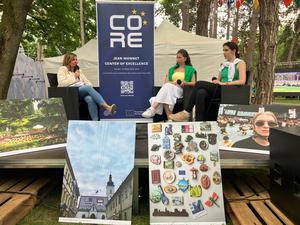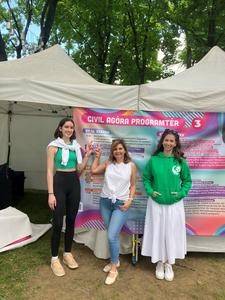On 16 July 2025, an exciting and thought-provoking roundtable discussion occurred in the Civil Agora program space of the Campus Festival in Debrecen. Participants included Annamária Kitta, project manager of the Jean Monnet Centre of Excellence: Cultivating Our European Resilience and Evolution (CORE), and two students from the International and European College for Advanced Studies (NESZK), Janka Németh and Hanna Várhelyi. They shared their thoughts on European integration, EU opportunities, and young people's role in shaping Europe's future.
The first part of the discussion introduced NESZK, which has offered professional and academic development opportunities since 2017 for international relations, the EU, and security policy students. The college aims to support students' research and publication activities, foster community building, and enhance language skills.
In the second part of the panel, Janka Németh and Hanna Várhelyi explained the foundations of European integration in an accessible way, providing a basis for understanding the goals of the projects presented.
Annamária Kitta showcased several EU-funded projects running at the University of Public Service (LUPS): the bEU and CORE projects under the Jean Monnet action and the recently terminated Camino initiative. All three projects share the goal of strengthening European identity and encouraging democratic participation, especially among young people.
Jean Monnet's actions are key sub-programs of the European Union's Erasmus+ program, which supports education, research, and dialogue related to European integration worldwide. Named after Jean Monnet, one of the intellectual founding fathers of European unity, these actions represent the idea of a knowledge-based, democratic, and cooperative Europe.
The program places particular emphasis on involving younger generations, as their active participation and awareness are crucial for the EU's future. Jean Monnet actions thus have not only academic but also societal impact: they build bridges between academia, policymakers, and citizens.
The bEU project examined EU resilience through identity-building, while CORE analyses the EU's resilience by treating crises as opportunities. Both projects are led by Prof. Dr. Boglárka Koller, Jean Monnet Chair, head of the Department of European Studies, who successfully implemented the Jean Monnet Module at LUPS.
The Camino project celebrated the 20th anniversary of the EU's 2004 enlargement with cultural and community events in international cooperation. Its goal was to promote European diversity and intercultural dialogue.
During the discussion, participants emphasised that the future of the EU cannot be imagined without active, informed, and committed young people.
To conclude the event, participants were invited to join the CORE community, where study competitions, open online courses, and research opportunities await those interested. The discussion was informative and inspiring, envisioning a Europe shaped by young people together, consciously, and responsibly.

